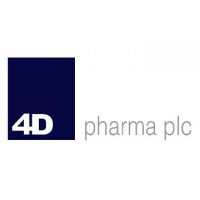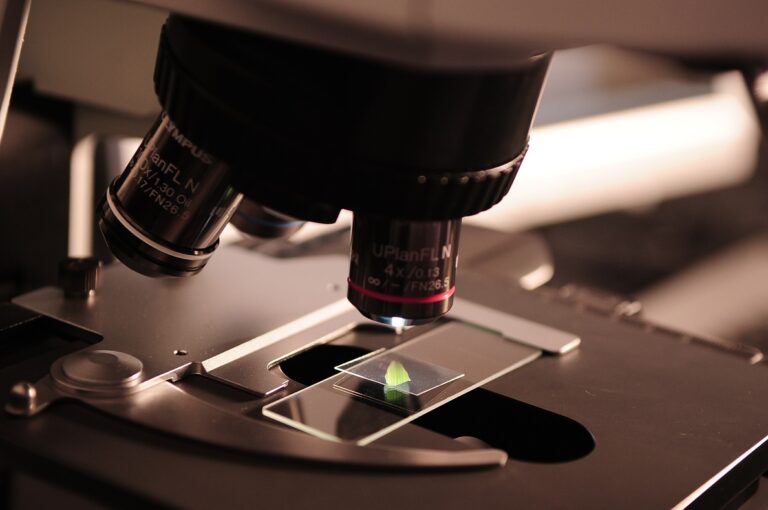4D pharma plc (LON:DDDD), a pharmaceutical company leading the development of Live Biotherapeutics, has today announced the interim results for the Company and its subsidiaries for the six months ended 30 June 2018.
Financial highlights
· Net assets as at 30 June 2018 of £58.7 million (30 June 2017: £75.3 million and 31 December 2017: £69.8 million)
· Cash and cash equivalents and short-term deposits at 30 June 2018 of £36.6 million (30 June 2017: £59.8 million and 31 December 2017: £50.0 million)
· Loss attributable to the owners of the parent undertaking for the six months ended 30 June 2018 of £11.3 million (30 June 2017: £11.3 million* and 31 December 2017: £19.4 million*)
· Research and development expenditure for the six months ended 30 June 2018 of £11.8 million (30 June 2017: £8.3 million and 31 December 2017: £16.9 million)
Operational and clinical highlights
· Entering into clinical collaboration agreement with subsidiary of MSD (tradename of Merck & Co., Inc., Kenilworth, N.J., USA) to conduct a clinical trial evaluating the combination of KEYTRUDA® (pembrolizumab), an anti-PD-1 therapy marketed by MSD, and 4D’s Live Biotherapeutic candidate MRx0518 in patients with solid tumours; the phase I study will evaluate safety, tolerability and preliminary clinical benefit of the combination of KEYTRUDA® with MRx0518 in patients who progressed on prior PD-1 inhibitor therapy with renal, bladder, melanoma and non-small cell lung cancer
· Clearance by the Medicines and Healthcare Products Regulatory Agency (“MHRA”) of the Clinical Trial Application for MRx0518, the first Live Biotherapeutic trial in cancer; the first-in-human, two-part phase Ib study will evaluate the safety, tolerability and anti-tumour immuno-modulatory effects of MRx0518 in patients with multiple solid tumour types
· Clearance by the US Food and Drug Administration (“FDA”) of an Investigational New Drug Application for Blautix, the Group’s Live Biotherapeutic for the treatment of Irritable Bowel Syndrome (“IBS”); the double-blind, placebo-controlled multicentre phase II study will evaluate the efficacy and safety of Blautix in patients with IBS with constipation (“IBS-C”) and IBS with diarrhoea (“IBS-D”)
· Clearance by the MHRA and the Health Products Regulatory Authority (“HPRA”) to commence the phase II study of Blautix at sites in the UK and Ireland
Since the period end
· Positive top-line results for the Phase Ib study of the Company’s Live Biotherapeutic Thetanix in paediatric patients with Crohn’s disease; achieving the primary objective of demonstrating that Thetanix was well tolerated with a good safety profile
* Note: this includes a £3.5 million non-recurring charge in relation to the successful completion of the first milestone for 4D Pharma Cork Limited.
Chairman’s statement
David Norwood, Chairman of 4D pharma plc, commented:
“Through the successful development of its clinical programmes in the first half of 2018, the Company continues to lead the development of Live Biotherapeutics, as we seek to secure robust clinical data to support the use of this new class of drugs across multiple indications, and from there to progress towards our goal of producing Live Biotherapeutics as safe and effective therapies. I would once again like to thank the Board, our employees and our shareholders for their continued support.”
Chairman and Chief Executive Officer’s Joint Review
David Norwood, Non-Executive Chairman, and Duncan Peyton, Chief Executive Officer
The microbiome
Whilst 4D is founded on science, innovation and forward thinking, it is history that tells us the most.
The work of von Behring and the development of serum therapy evolved through decades of research into the multi-billion dollar industry of antibody technology. The approval of Epogen in 1989 is another example, beginning in the 17th century with the first blood transfusions in animals that eventually led to the development of Epogen, one of the first drugs to come out of the biotech industry. Both the development of antibodies and Epogen show us that from a complex source (whether this be blood or serum), through scientific endeavour, the focus ultimately ends on functional singularity.
At 4D we believe the development of Live Biotherapeutics is another example of form following function. From the initial reports of faecal matter used in the fourth century to treat food poisoning and diarrhoea, through the development and use of faecal transplants to treat clostridium difficile infection in the 1950s, we are now seeing the first Live Biotherapeutics entering the clinic. However, whereas early Chinese medicine and faecal transplants primarily treated gastrointestinal issues, the Live Biotherapeutics developed by 4D not only treat disease of the gut, but also address the major challenges of cancer, asthma and autoimmune conditions.
Today, rather than form following function, development of new drugs is arguably restricted by the common tools available (i.e. small molecules, proteins and antibodies), and could be considered function following form. Furthermore, drug development is targeted towards a single “validated” target, despite the knowledge that disease pathways do not operate in isolation. Considering this, it is perhaps no surprise that drugs have significant side effects, and that not all drugs are effective in all patients.
At the level of complex organisms, functionality exists at different levels (organs, tissues and cells), with cells being the simplest unit of independent functionality. Considering more recent history, if the functionality of a single cell can be harnessed in context (i.e. in the state in which it exists naturally), for example with Chimeric Antigen Receptor (CAR-T) or stem cell transplants, the effects are remarkable.
Within the microbiome, a single strain is the simplest cellular unit of functionality, and the microbiome is now understood to have significant functionality relevant to human health.
It is this potential that 4D is seeking: form following function, single strains impacting known disease pathways.
Working with pharma
As more research is done within the field of the microbiome and more papers are published, whether by third parties or those more recently published by the 4D research teams, the stronger the interest grows in the microbiome from the pharmaceutical industry.
The pharmaceutical industry is actively seeking out new innovation, not only in new therapeutics, but also in ways to enhance their existing therapies.
An example of this innovation is the clinical collaboration agreement 4D announced in early June, with a subsidiary of MSD (tradename of Merck & Co., Inc., Kenilworth, N.J., USA).
This trial will evaluate MRx0518, 4D’s lead oncology programme, which has shown therapeutic potential in a variety of tumour types in pre-clinical models and has the potential for synergy in combination with checkpoint inhibitor therapies. The phase I study will evaluate safety, tolerability and preliminary clinical benefit of the combination of KEYTRUDA® with MRx0518 in patients who progressed on prior PD-1 inhibitor therapy with renal, bladder, melanoma and non-small cell lung cancer.
Working within a developing regulatory and clinical environment
The microbiome and Live Biotherapeutics is an emerging field, and as such the regulations are evolving.
The US Food and Drug Administration (“FDA”) issued a guidance document in 2016 relating to early stage clinical development of Live Biotherapeutic products. Following on from this, the European Pharmacopoeia has adopted three new quality standards for Live Biotherapeutics for human use in April 2018, with the new texts becoming effective in April 2019. 4D contributed to the development of these quality standards, acting as the UK’s representative on the working party that developed the standards.
Throughout regulatory discussions relating to the development of 4D’s own products, the focus has primarily been on the safety of patients, but also on developing the thinking surrounding Live Biotherapeutics through rigorous scientific debate. This interaction has led to 4D conducting phase I trials in patients as opposed to healthy subjects, not only demonstrating the potential to develop safer drugs, but also granting us an insight, albeit at a low level, into what we may expect to see in patient population earlier than under traditional development timelines.
Notwithstanding that our trials to date have been in patients, 4D is now preparing to expand these trials to generate data that is both significant and statistically relevant to further demonstrate the potential in the microbiome. An example of this is our phase II study in Irritable Bowel Syndrome (“IBS”), a double-blind, placebo-controlled multicentre trial currently being conducted with 500 patients across sites in Europe and the United States. As previously announced, this is the largest trial being conducted with a Live Biotherapeutic which, if successful, we believe will be sufficient to demonstrate efficacy and bring more understanding to the development of Live Biotherapeutics.
Developing a scientific viewpoint/standing
At 4D the bedrock of our business is research; only if 4D continues to build world-leading research will we ultimately succeed.
Whilst we continuously push our programmes through development, the innovative work of our scientific teams continues. One measure of success of our research is the development of our intellectual property estate and 4D continues to lead the field. We now have 355 granted patents across 46 patent families. As our teams uncover new bacteria that are therapeutically relevant, and unpick the mechanism of action or develop novel production techniques, the intellectual property estate will continue to grow in size and value.
Having secured a class leading patent position, our research teams are able to lead the debate on the role of the microbiome and development of Live Biotherapeutics.
Over the last six months the research teams have presented at key microbiome conferences and published papers on some of their findings with immediate relevance to our clinical programmes, such as the potential of the microbiome to serve as novel therapeutic inhibitors of the human enzyme histone deacetylase (“HDAC”), which could lead to new programmes in cancer or neurodegeneration. As we continue our world-leading research, and build our patent portfolio, we will continue to publish and discuss our work.
Conclusion
At 4D pharma we face the challenge of bringing a new blockbuster drug, in a new therapeutic class, to transform patient lives.
We can only continue to meet this challenge if we focus on the core principles of developing science and delivering therapies.
David Norwood
Non-Executive Chairman
Duncan Peyton
Chief Executive Officer
27 September 2018






































